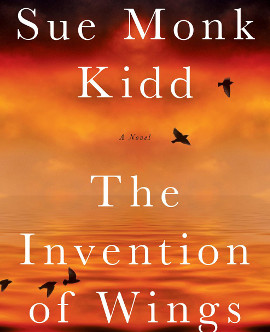Elaine Burns
 This is the third novel written by Kidd. Her first was the highly acclaimed The Secret Life of Bees. Her second was The Mermaid Chair. All of her books are written from the perspective of a southerner, most notably a South Carolinian, which Kidd is. All deal with coming to grips with injustices both here and now and well back in the past.
This is the third novel written by Kidd. Her first was the highly acclaimed The Secret Life of Bees. Her second was The Mermaid Chair. All of her books are written from the perspective of a southerner, most notably a South Carolinian, which Kidd is. All deal with coming to grips with injustices both here and now and well back in the past.
Kidd was by profession a registered nurse, working many years as a bedside nurse, an administrator and an educator. She is also a deeply religious woman who has written many articles on spiritual paths, as well as being editor of Guidepost Magazine. Her most notable religious tract describes her path from the abandonment of fundamentalism and her encounter with women’s spirituality, The Dance of the Dissident Daughter: A Woman’s Journey from Christian Tradition to the Sacred Feminine (Harper SanFrancisco, 1996).
The Invention of Wings looks at pre-civil war slavery and the abolitionist movement. Kidd has tried to be true to the characters, most notably Sarah Grimke, a famous, at the time, member of the movement and also a pioneer in women’s rights. Sarah casts the opinion that if slaves should be given freedom and independence so should women.
Herein lies my only criticism of the novel. Sarah Grimke was real, so was her sister Angelina. Both have become largely a footnote in history, I’m afraid. With her sister Angelina and Angelina’s husband, Theodore Weld, Sarah wrote American Slavery as It Is, a “testimony of a thousand witnesses” that influenced Harriet Beecher Stowe’s novel Uncle Tom’s Cabin, published 13 years later. The trio also spoke, at a time when women didn’t, at rallies throughout the north.
The epilogue describes the Grimke sisters’ heroics and leadership of the abolitionist movement. It would have been nice if that information had been available at the start of the novel. I am not saying this is non-fiction, only that it is quite tightly and historically based on a real person. Subsequent research has been fascinatingly educational. That I didn’t know this is more my fault than anything.
The story begins in Charleston in 1803 on the day 11-year-old Sarah Grimké is given Hetty, or “Handful”, roughly her same age, as a birthday present. A born abolitionist whose earliest memory is of witnessing a slave being whipped (a trauma that’s responsible for the stammer that still afflicts her), Sarah immediately tries to “return” Handful. When this attempt fails, she writes an official “certificate of manumission,” which is promptly torn in two. Although Handful has to serve as Sarah’s personal maidservant, the girls share confidences and even an illicit picnic on the roof. Sarah also teaches Handful to read and write, an infraction that results in harsh penalties for both.
To her credit, Kidd doesn’t insist on a close friendship between these characters. They like each other, but uneasily, Sarah out of guilt and Handful because she knows she’s listed on a household inventory “right after the water trough, the wheelbarrow, the claw hammer and the bushel of flint corn”. Instead, through alternating chapters narrated by Sarah and Handful spanning 35 years, the novel juxtaposes their experiences of oppression. Plain but studious Sarah reads Voltaire, studies Latin with an older brother and dreams of becoming the first female jurist. But when she reveals this ambition to her father, a judge, he declares angrily that she’s speaking “nonsense”. Her mother later tells her that “every girl must have ambition knocked out of her for her own good” and forces her to start husband-hunting.
Meanwhile, Handful’s mother, Charlotte, a rebellious and talented seamstress, makes a “story quilt”, detailing the history of their bondage, beginning with the kidnapping of Handful’s “granny-mauma” in Africa. Early on, Charlotte is also hideously punished for stealing a bolt of cloth. Naturally, Handful distrusts all white people, even the painfully well-meaning Sarah, and soon turns rebellious herself. The truly harrowing moments in the book all belong to her and, inevitably, so does the larger share of the reader’s sympathy.
In this day and age, the atrocities of slavery are difficult to understand in Canada, but in many parts of the world this story continues, if not in practice, in thought. People are devalued by their nationality, religion, sexual orientation, as well as the colour of their skin. Slavery still exists! The gruesomeness of the slave’s punishments are made more disgusting by the fact that they are real.
The Invention of Wings is a wonderful read, a great story and an introduction to the Grimke sisters. There is lots of research you are called to do to fully comprehend the story, or you can enjoy it as a novel. The choice is yours but, but I am betting Google will be flying.
Just for those of you who might Google the author there is a direct link to the thoughts and views of Thomas Merton, an early 20th century American monk. This is also quite invigorating.
I love books that make me think, that confirm for me that I do not know everything (big time!) That, this novel does in spades, while being an enticing read. Kidd does not hit you over the head with the wrongness of slavery, she allows you to come to that decision on your own, and brother will you.
Our May read is Life after Life by Kate Atkinson.
FOML Update
Net Shed time is coming! Join us the the long weekend in May, at the corner of Collingwood and Bayfield, for our first opening. Come, browse, enjoy a peek at the books while enjoying the water view and the sunny spring weather (my mouth to God’s ears).
Book purchases are by donation.
While there you can sign up to become a member of the Friends of the Meaford Library for $3. The choice is yours to volunteer or only support us. We welcome either option.
The Meaford Public Library is very important to this community, help us contribute to their successes.












